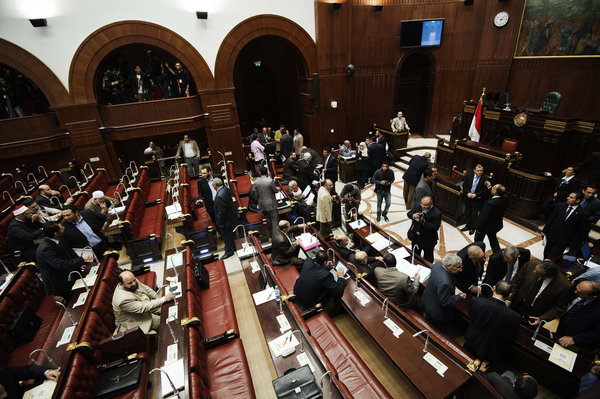
The past few days Egypt has experienced are like no other in the country’s history. They have been so filled with developments, that even the keen observer is unable to make an assessment, and can only follow as the story unfolds, reading the news and analysis. If it is this difficult for them to follow the latest coming out of Egypt, how then is the ordinary Egyptian expected to keep up? The fast-paced developments make it all too easy to skim over events, but the Constituent Assembly voting on the draft constitution in the span of one day certainly merits not only a pause, but deserves analysis.
On November 29, the Constituent Assembly began its ‘historic’ meeting. The meeting was to last for 17 full hours, beginning on Thursday afternoon, ending the next morning. During that time, the assembly voted on all 236 articles in the draft constitution. I, and many other Egyptians, can view what happened only within the framework of the ruling party and its constituent assembly attempting to escape the many successive crises that Egypt is facing.
The Freedom and Justice Party (FJP), with its majority in the assembly, wanted to escape a possible ruling by the Supreme Constitutional Court (SCC), expected on December 2nd. The SCC was to issue its verdict on the constitutionality of the law under which the assembly was formed. With the possible threat of dissolution hanging over the assembly’s head, the voting on the draft constitution took place in a dubious manner. It appeared that the Assembly wanted to avoid the application of the ‘rule of law’ where its own existence was concerned, and accelerated its pace so that the judiciary was unable to affect it.
President Mohamed Morsi, in an attempt to bring Egypt out of its crisis, issued a constitutional decree that is anything but constitutional. He then went on to convince his constituency that a new constitution would resolve all of Egypt’s problems – when that could not be farther from the truth.
While Morsi promises that the November 22 decree will be lifted with the ratification of the new constitution, it’s worth nothing the final article in that constitution. Article 236 states:
“Constitutional declarations issued by the Supreme Council of the Armed Forces and by the President of the Republic from 11 February 2011 to the date of the adoption of this Constitution are hereby repealed, while their consequent effects shall remain valid and in force and may not in any way be appealed against.”
This means that any impact Morsi’s November 22 decree had will remain in full force – including the immunity the decree affords the Constituent Assembly and the Shura Council, as well as the destruction of the judiciary’s independence. In an attempt to resolve on crisis, Egypt’s leaders did not realize that they were simply throwing Egypt into a whirlpool of successive crises.
Based on the series of events described above, one can assume that Morsi ordered the Constituent Assembly to speed up its work – believing that a finalized constitution would offset any anger caused by the November 22 decree. This theory becomes more apparent when you consider the fact that this very decree extended the Assembly’s looming deadline by another two months while they finalized the constitution in just a few hours
The decision to speed up the constitutional process has had many consequences in deepening the political crisis, some of which can be seen in the draft constitution itself. A striking example is the Constituent Assembly’s attempt to remove the 50% quota afforded to workers and farmers in the parliament. The decision would have passed if it were not for one member of the assembly who called for the quota to remain as is. The assembly discussed the issue in a matter of minutes, in the early hours of Friday morning, and decided to restore the quota. Can this kind of approach be accepted of a constituent assembly? The parliamentary quota is no trivial matter, one which can have serious social and political ramifications, and yet a discussion on the topic didn’t last longer than a few minutes.
Is there any true justification for the speed at which Egypt’s draft constitution was written?
Yussef Auf is an Egyptian judge and 2012 Humphrey Fellow at American University’s Washington College of Law. He is currently pursuing a PhD in Constitutional Law and Political Systems at Cairo University. He can be reached at yussufauf@hotmail.com
Photo Credit: AFP
Image: CA%20November%2029%20AFP.jpg

